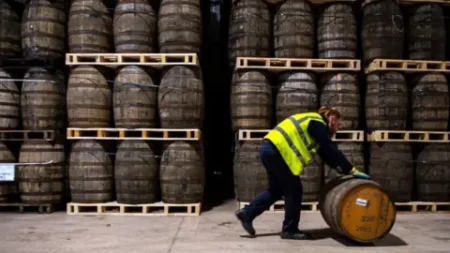In a significant development for the aviation industry, Boeing has entered into an agreement with the U.S. Justice Department, agreeing to pay $1.1 billion (£811.5 million) to avoid criminal prosecution related to two tragic crashes involving its 737 Max aircraft. This settlement arises from the catastrophic incidents that claimed the lives of 346 individuals: the first occurred in October 2018 with Lion Air Flight 610, and the second in March 2019 with Ethiopian Airlines Flight 302.
The deal includes a multifaceted compensation strategy aimed at addressing the fallout from these disasters. A substantial portion of the settlement, amounting to $444.5 million, will be allocated to the families of the victims. In an effort to enhance its corporate culture and operational standards, Boeing will also invest approximately $455 million in improving its compliance, safety protocols, and quality assurance programs. Additionally, the company is subject to a criminal penalty of $487.2 million, of which $243.6 million has already been paid in a 2021 settlement agreement.
Boeing’s announcement highlighted that, under the terms of this settlement, the Justice Department has agreed not to pursue further criminal charges against the aerospace titan. This legal maneuver allows Boeing to avoid a trial that was scheduled to start on June 23, 2025, centered on allegations of fraud and negligence tied to the development and certification of the 737 Max series.
The two crashes in question have severely impacted Boeing’s reputation and business operations. The Lion Air Flight 610 crash took place in the Java Sea, just 13 minutes after takeoff from Jakarta, Indonesia, tragically ending the lives of all 189 passengers aboard. Following that, Ethiopian Airlines Flight 302 experienced a similar fate, crashing six minutes post-departure from Addis Ababa, Ethiopia, resulting in the deaths of all 157 individuals on board.
This series of incidents sparked widespread scrutiny of Boeing’s safety practices and raised critical questions regarding the oversight offered by regulatory authorities. Reports indicated that shortcomings in the aircraft’s automated flight control system, known as the Maneuvering Characteristics Augmentation System (MCAS), played a significant role in both crashes. The MCAS was designed to prevent the aircraft from stalling but malfunctioned due to erroneous sensor data, leading to tragic outcomes.
The public revelation of these faults propelled Boeing into a series of investigations and resulted in the grounding of the entire 737 Max fleet for approximately 20 months—a period wherein no flights using this model were permitted. The grounding deeply affected airlines worldwide and resulted in significant financial losses for Boeing, as well as a crisis of confidence amongst passengers.
This settlement highlights the continuing repercussions the crashes have had on Boeing, which has been striving to restore its public standing and ensure future compliance with safety standards. In its response to the settlement, Boeing acknowledged the devastation caused by the crashes and expressed a commitment to improving its safety measures, ensuring that such tragedies do not recur. As part of these efforts, the company is deeply focusing on fostering a culture of safety and transparency within its operational framework.
The resolution of this legal action reflects broader industry concerns regarding safety oversight in aviation and the need for stringent regulatory practices. Moving forward, it is crucial for Boeing to demonstrate its dedication to safety and compliance as it navigates the complexities of its public image and the challenges of regaining passenger trust. With the approval of this settlement, Boeing has also taken a significant step towards mitigating its legal woes and focusing resources on enhancing the safety of its aircraft.











